Institute for Design and Public Policy
Project

2016-2018
Rhode Island School of Design
![]()
Rhode Island School of Design
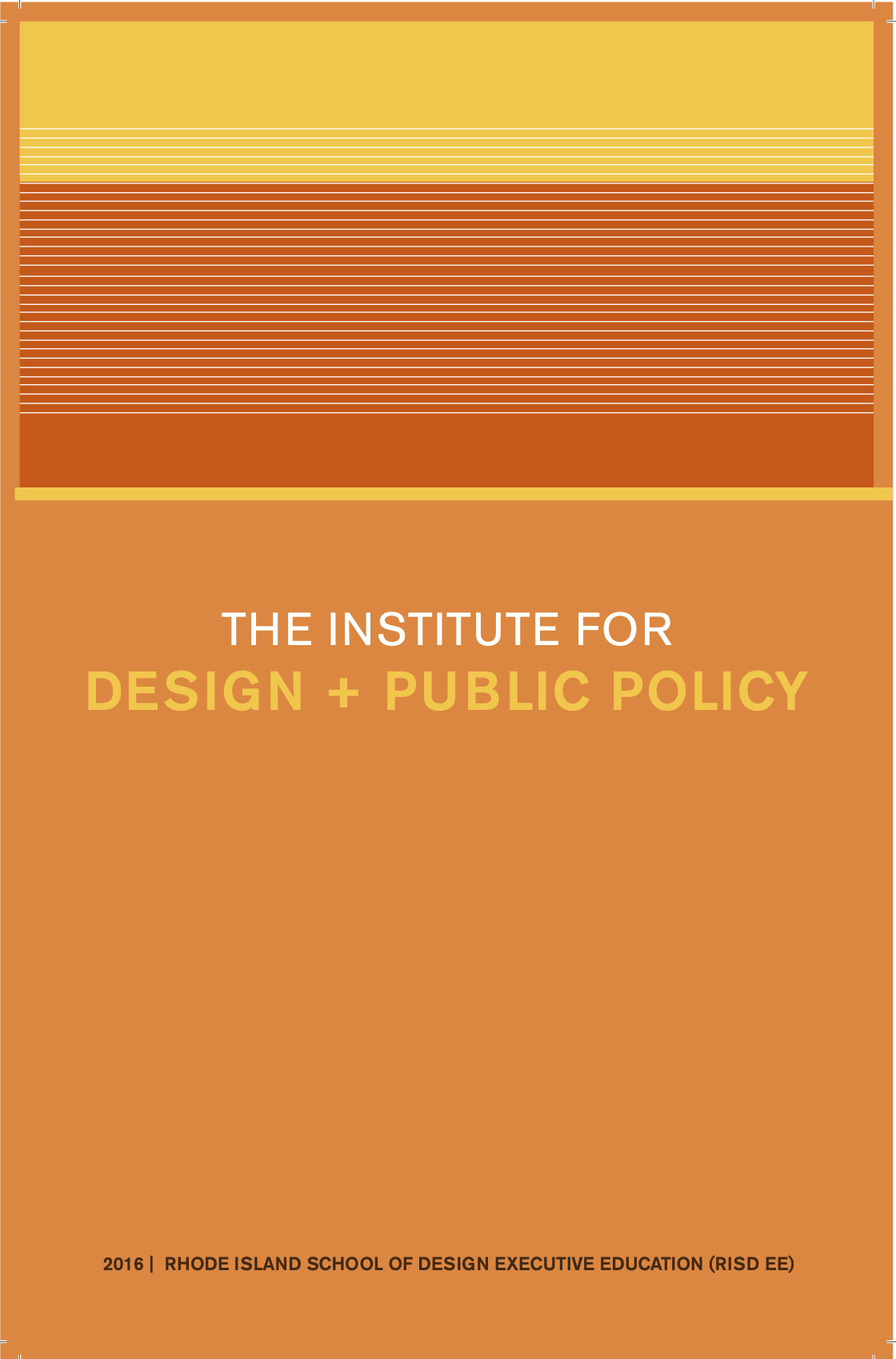
The Institute for Design and Public Policy (IDPP) was a collaborative initiative between the Rhode Island School of Design (RISD) and the U.S. Department of State’s Bureau of Educational and Cultural Affairs. Created to bridge the gap between design and governance, the Institute brought together leaders from government, non-profits, and the private sector to explore how human-centered design (HCD) can be applied to address complex public policy challenges.
The IDPP led intensive week-long studio workshops, each engaging in different challenges and with a different cohort of stakeholders. The workshops prioritized experience-based training, learning to integrate HCD principles into policymaking processes. The curriculum emphasized inclusive design as a powerful tool to foster creative problem-solving, improve service delivery, and develop more equitable and responsive policies. Previous studios included: Civics in the 21st Century, Drug Trafficking, and Cyber Security.
The Institute served not only as a training ground but also as a platform for building a cross-sector community of practice. Participants developed a shared belief in the potential of design to enhance foresight, empathy, and collaboration in policy development, bringing to life the ideal of a government “for the people.” This project laid the groundwork for an emerging movement at the intersection of design and public service.
The IDPP led intensive week-long studio workshops, each engaging in different challenges and with a different cohort of stakeholders. The workshops prioritized experience-based training, learning to integrate HCD principles into policymaking processes. The curriculum emphasized inclusive design as a powerful tool to foster creative problem-solving, improve service delivery, and develop more equitable and responsive policies. Previous studios included: Civics in the 21st Century, Drug Trafficking, and Cyber Security.
The Institute served not only as a training ground but also as a platform for building a cross-sector community of practice. Participants developed a shared belief in the potential of design to enhance foresight, empathy, and collaboration in policy development, bringing to life the ideal of a government “for the people.” This project laid the groundwork for an emerging movement at the intersection of design and public service.

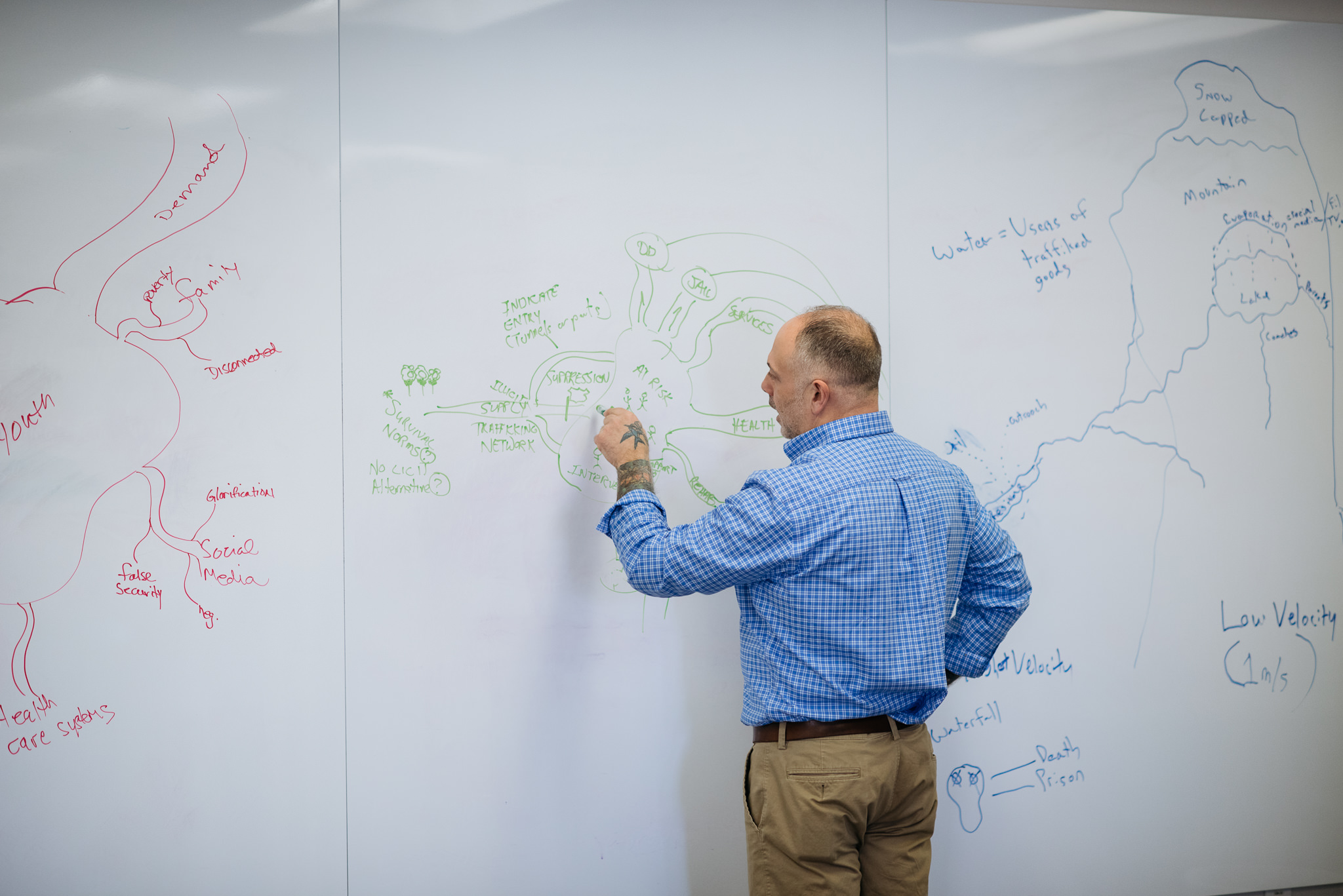
21st Century Civics
2016
Participants:
Amica Insurance
BOND
Center for Women and Enterprise
City of Providence Dept. of Planning & Development
Common Cause Rhode Island
Hasbro, Inc.
Prisere LLC
Rhode Island Department of Health
Rhode Island School of Design
Rhode Island Urban Debate League
RI Coalition for the Homeless
Rhode Island Council for the Humanities
Rhode Island Department of State Southside Community Land Trust
The Nature Conservancy
Town of Warren
Tufts University
U.S. Bankruptcy Court (D.R.I.)
US EPA, Office of Research & Development
2016
Participants:
Amica Insurance
BOND
Center for Women and Enterprise
City of Providence Dept. of Planning & Development
Common Cause Rhode Island
Hasbro, Inc.
Prisere LLC
Rhode Island Department of Health
Rhode Island School of Design
Rhode Island Urban Debate League
RI Coalition for the Homeless
Rhode Island Council for the Humanities
Rhode Island Department of State Southside Community Land Trust
The Nature Conservancy
Town of Warren
Tufts University
U.S. Bankruptcy Court (D.R.I.)
US EPA, Office of Research & Development
The 2016 challenge explored how government might reimagine civics in an age of complexity, inequality, and digital transformation.
As the boundaries between citizens, governments, and institutions shift, the Institute explored how new civic mechanisms can bridge persistent divides and generate shared capacity for social change.
Through a mix of reflection and experimentation, participants examined four dimensions of civic interaction: Government to Citizen (G2C), Citizen to Government (C2G), Citizen to Citizen (C2C), and Government to Government (G2G).
Participants examined the evolving role of individuals, communities, and networks in shaping civic life. Key questions were explored such as the relevance of “top-down” vs. “bottom-up” models, how digital culture reconfigures public engagement, and how open civic systems might consolidate progress. Working with uncertainty, complexity, and risk, this cohort experimented with how design can contribute to policy-making that reflects new civic realities and unlock transformative possibilities at multiple scales.
As the boundaries between citizens, governments, and institutions shift, the Institute explored how new civic mechanisms can bridge persistent divides and generate shared capacity for social change.
Through a mix of reflection and experimentation, participants examined four dimensions of civic interaction: Government to Citizen (G2C), Citizen to Government (C2G), Citizen to Citizen (C2C), and Government to Government (G2G).
Participants examined the evolving role of individuals, communities, and networks in shaping civic life. Key questions were explored such as the relevance of “top-down” vs. “bottom-up” models, how digital culture reconfigures public engagement, and how open civic systems might consolidate progress. Working with uncertainty, complexity, and risk, this cohort experimented with how design can contribute to policy-making that reflects new civic realities and unlock transformative possibilities at multiple scales.

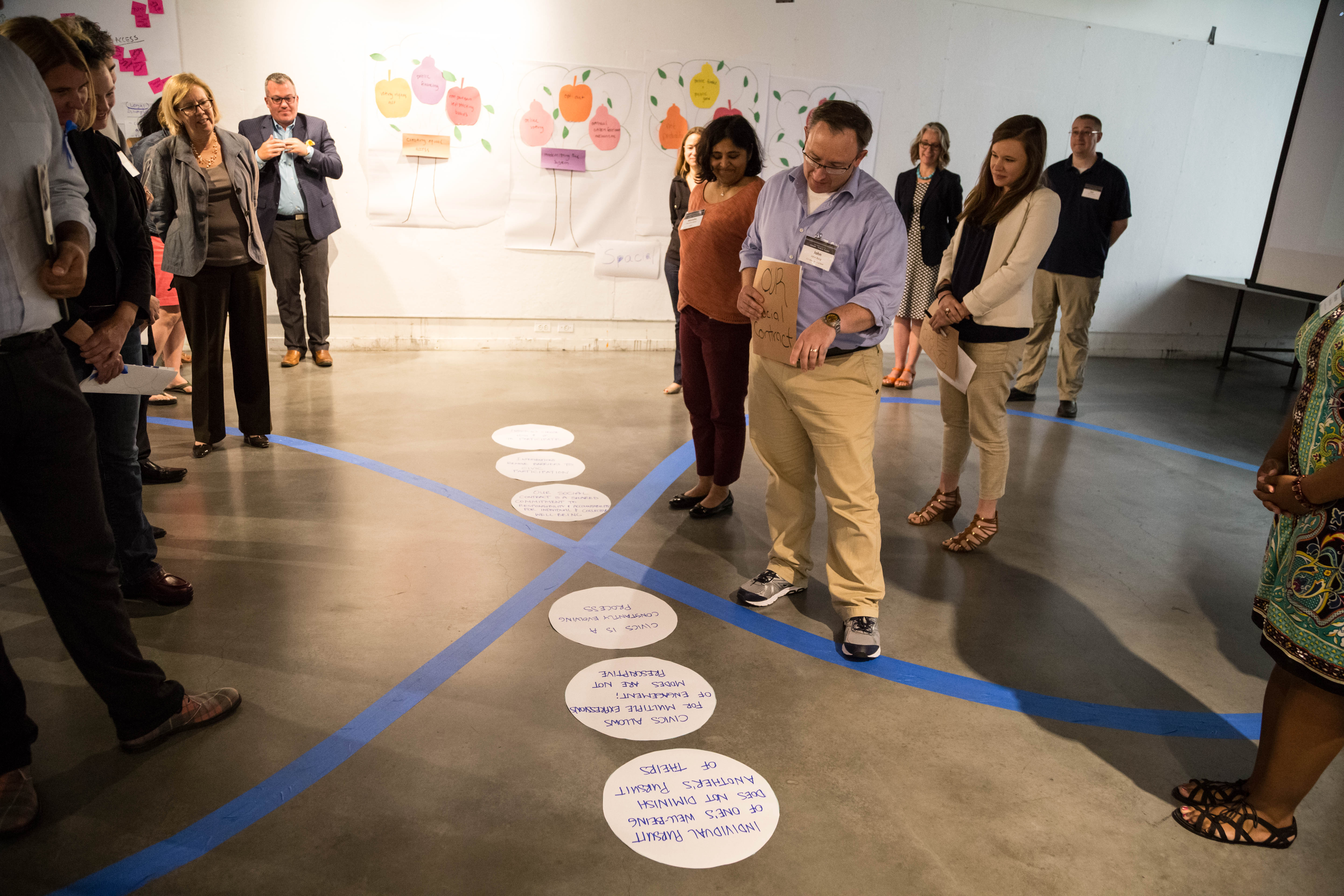


Trafficking Systems
2017
2017
Participants:
Department of Homeland Security
Immigration & Customs Enforcement
Federal Bureau of Investigations
Department of Treasury
Rhode Island National Guard Special Operations
Springfield Police Department
Harvard University
Roger Williams University
Naval War College
University of Rhode Island
Department of Homeland Security
Immigration & Customs Enforcement
Federal Bureau of Investigations
Department of Treasury
Rhode Island National Guard Special Operations
Springfield Police Department
Harvard University
Roger Williams University
Naval War College
University of Rhode Island
The ‘Trafficking Systems’ Prototype Studio was the work of a new and unprecedented collaboration between federal and local agencies and institutions, specifically Special Operations Command NORTH (SOCNORTH), Joint Special Operations University (JSOU), Rhode Island National Guard (RING) and Rhode Island School of Design (RISD).
This initiative was the culmination of a two-year exploration process, serving as both a model for future (and potentially unconventional) interagency collaboration and a prototype for embedding design-based practices within the U.S. Special Operations Forces (SOF) enterprise. It illustrated the values, structure, and impact of applying design to complex, national security challenges.
The studio was shaped through the contributions of several specialized partners. It drew on deep knowledge of the SOF enterprise and its evolving challenges, insights into current interagency dynamics, a nuanced understanding of Rhode Island’s socio-political landscape, world-class design and facilitation expertise from an internationally renowned design institution, and academic contributions from leading regional universities.
Held over three days, the studio supported SOCNORTH’s mission to secure the homeland. It engaged participants in addressing a core strategic question: What systemic interventions could SOCNORTH and its Joint, Interagency, Intergovernmental, Multinational, and Commercial (JIIM-C) partners implement to reduce the influence and operational space of narcotrafficking organizations across its area of responsibility?
To tackle this, participants from federal, state, and local agencies collaborated to map the narcotrafficking system, identify overlapping authorities, and co-design systemic interventions. The studio created a foundation for innovative, cross-sector strategies to address trafficking in all its forms—emphasizing integrated action, long-term impact, and design-driven transformation.
This initiative was the culmination of a two-year exploration process, serving as both a model for future (and potentially unconventional) interagency collaboration and a prototype for embedding design-based practices within the U.S. Special Operations Forces (SOF) enterprise. It illustrated the values, structure, and impact of applying design to complex, national security challenges.
The studio was shaped through the contributions of several specialized partners. It drew on deep knowledge of the SOF enterprise and its evolving challenges, insights into current interagency dynamics, a nuanced understanding of Rhode Island’s socio-political landscape, world-class design and facilitation expertise from an internationally renowned design institution, and academic contributions from leading regional universities.
Held over three days, the studio supported SOCNORTH’s mission to secure the homeland. It engaged participants in addressing a core strategic question: What systemic interventions could SOCNORTH and its Joint, Interagency, Intergovernmental, Multinational, and Commercial (JIIM-C) partners implement to reduce the influence and operational space of narcotrafficking organizations across its area of responsibility?
To tackle this, participants from federal, state, and local agencies collaborated to map the narcotrafficking system, identify overlapping authorities, and co-design systemic interventions. The studio created a foundation for innovative, cross-sector strategies to address trafficking in all its forms—emphasizing integrated action, long-term impact, and design-driven transformation.
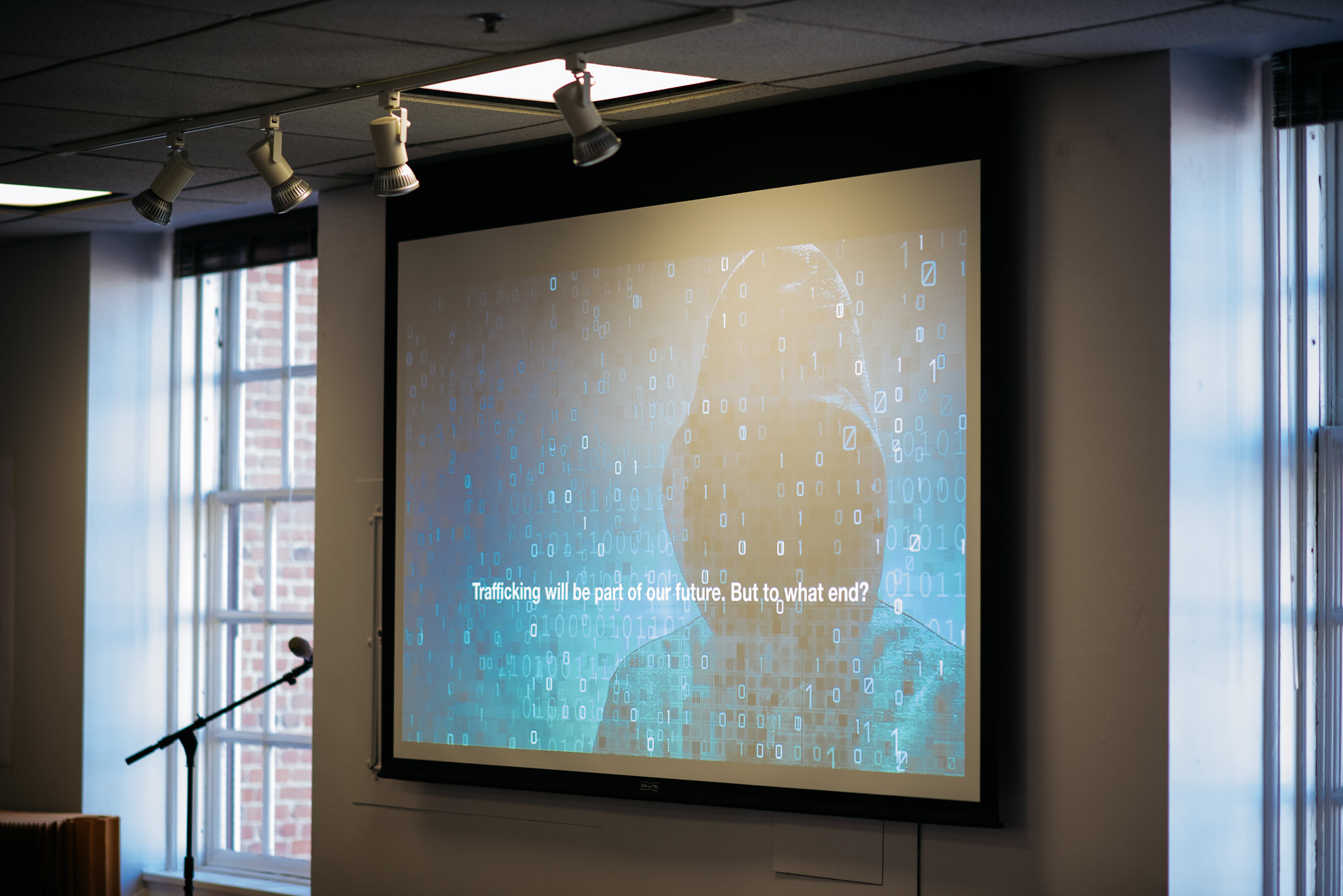


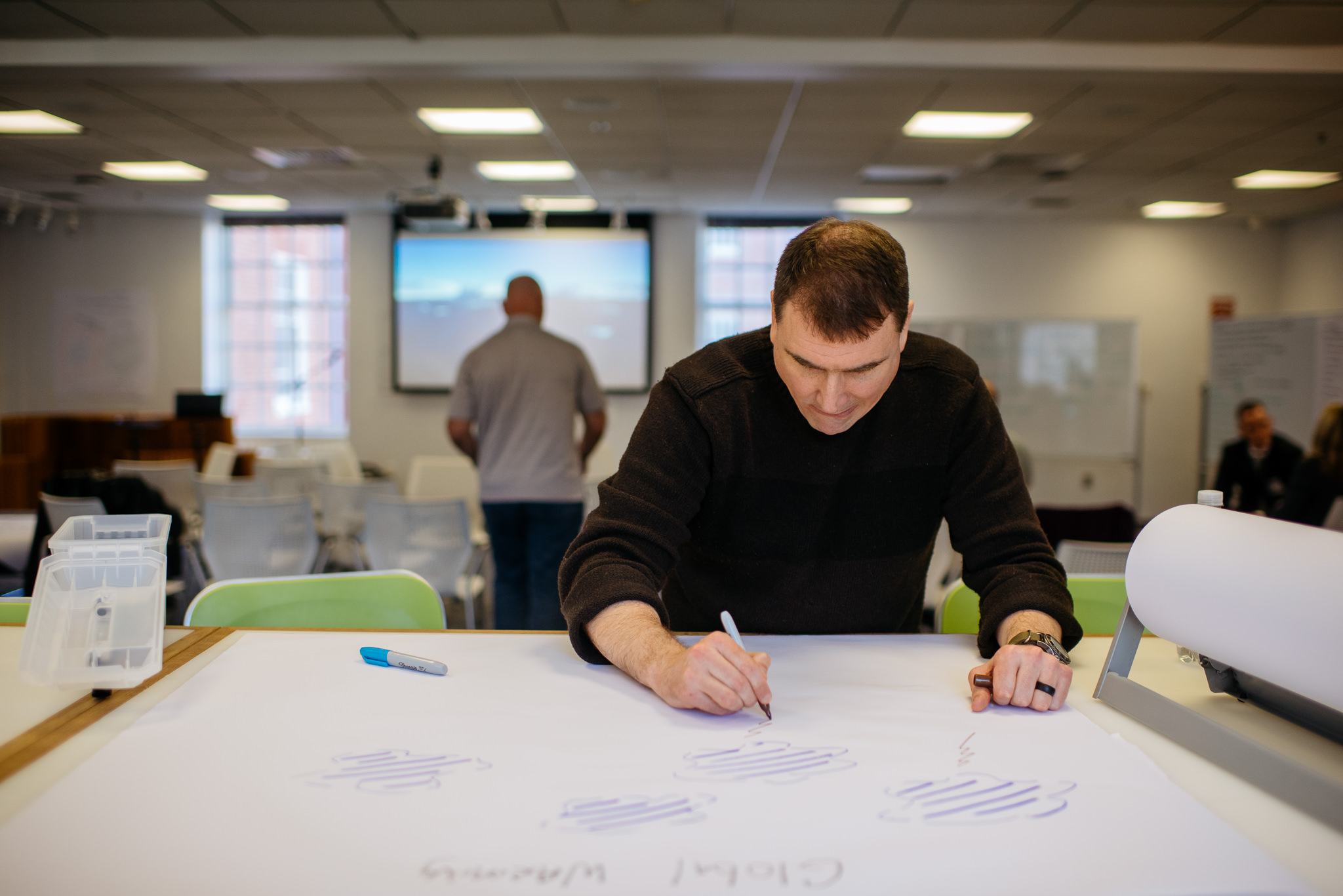





Cyber Security
2018
Participants
The Providence Group
University of Maryland Law School AT&T
Information Technology & Innovation FoundationNational Telecommunications & Information Administration
Federal Trade Commission
EU Legal Advisors
2018
Participants
The Providence Group
University of Maryland Law School AT&T
Information Technology & Innovation FoundationNational Telecommunications & Information Administration
Federal Trade Commission
EU Legal Advisors
The 2018 IDPP focused on cybersecurity and privacy in the wake of Europe’s GDPR legislation, exploring what such regulatory shifts might mean for the U.S. and how design could play a role in shaping future responses. Framed through the lens of transatlantic collaboration the workshop positioned design as a catalyst for imagining new creative, ethical, and governance frameworks.
The workshop also raised critical questions around corporate obligations, public-private partnerships, and the potential for ethical protocols that guide voluntary action in the absence of formal regulation. Ultimately, it asked: what kind of governance, accountability, and civic ethics are needed in an era defined by digital interdependence?
The workshop also raised critical questions around corporate obligations, public-private partnerships, and the potential for ethical protocols that guide voluntary action in the absence of formal regulation. Ultimately, it asked: what kind of governance, accountability, and civic ethics are needed in an era defined by digital interdependence?











Index